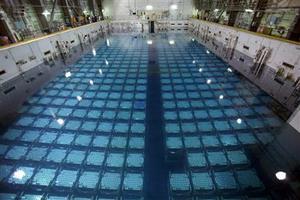Nuclear mattersSolving nuclear fuel storage problem more crucial than ever: MIT report
The Japan nuclear crisis adds to the urgency of dealing with radioactive used fuel, and may raise cost of new plants, MIT Energy Initiative study says; the report recommends that an interim solution be developed to remove spent fuel storage facilities at reactor sites, and move to regional, medium-term repositories where the fuel can be monitored and protected as it decays over time

Fukushima shows the danger of pool storage // Source: planetark.org
The United States and other countries around the world that are looking to nuclear power for their energy needs must consider how spent fuel will be handled as they construct new plants and examine existing ones, especially in light of the recent crisis in Japan, according to a comprehensive study from MIT.
The ongoing problems at Japan’s Fukushima Daiichi power plant — caused by the 11 March earthquake and tsunami — have been significantly exacerbated by the presence of used fuel housed in the reactor buildings, and demonstrate the urgency needed in dealing with such waste, the report’s authors say. It specifically underscores the importance of finding a way to deal with the growing amount of spent nuclear fuel housed at existing U.S. nuclear plants.
An MIT release reports that the report, a summary of which was released last September, recommends that an interim solution be developed to remove spent fuel storage facilities at reactor sites, and move to regional, medium-term repositories where the fuel can be monitored and protected as it decays over time. Spent fuel loses much of its radioactivity with every passing decade, as the most dangerous radioactive isotopes decay and lose much of their potency, thus diminishing the problem of long-term storage.
While there has been no change in the basic conclusions of the study, called “The Future of the Nuclear Fuel Cycle,” the study’s executive director Charles Forsberg, a research scientist in MIT’s Department of Nuclear Science and Engineering (NSE), says the situation in Japan “will place more emphasis on getting a geological repository program up and running” for the permanent storage of the United States’ spent nuclear fuel. Doing so, the study says, faces no real scientific hurdles, and is essentially a social and political issue at this point.
The release notes that the report says that there are other possible impacts on the future of nuclear power globally in the aftermath of the Japanese crisis, where four reactors at the Fukushima plant were crippled and work continues to bring the situation fully under control. In a postscript to the report’s introduction, the authors point out two other likely consequences, at least in the short run: The cost of new nuclear plants is likely to increase, as a result of the increased perception of risk associated with such plants, which will raise the cost of capital for plant construction; and public support for a
